Amazon is taking significant strides to maintain its e-commerce dominance by introducing two AI-powered algorithms that could impact the future of Retail Search. COSMO and RUFUS aim to enhance the customer shopping experience by moving beyond the traditional keyword-based search model.
What is COSMO?
COSMO, short for “Common Sense Knowledge Generation,” is Amazon’s advanced AI algorithm that is designed to understand customer behavior and intent behind searches. Unlike the traditional A9 keyword search model, COSMO leverages a deep understanding of user demographics, search history, and common sense knowledge to provide more personalized and relevant search results.
How COSMO Works
COSMO utilizes large-scale language models (LLMs) and constructs comprehensive knowledge graphs to interpret user intentions. This means that if you search for “men’s shoes for a wedding,” COSMO understands you are looking for formal, hard-bottom shoes. This understanding extends to various contexts, such as recognizing that pregnant women might prefer slip-resistant shoes, thus aligning search results more closely with actual user needs (Ecomtent.ai).
Why COSMO?
Rising Competition: Amazon is facing increasing competition from platforms like Temu, Shein, and TikTok shops, which are gradually eating into its market share in the US. This competitive pressure has necessitated a shift to more advanced and user-centric search functionalities to stay ahead (Code3.com).
Significant Opportunities: During testing, COSMO has shown promising results, including an 8% increase in navigation engagement rates, indicating higher customer satisfaction and interaction. This new system is expected to further integrate into Amazon’s search functionality, revolutionizing how users find and interact with products (Code3.com).
What is RUFUS?
RUFUS is Amazon’s generative AI-powered shopping assistant, now available to all US customers through the Amazon Shopping app. It enhances the shopping experience by answering product-related questions, providing comparisons, and making personalized recommendations based on conversational context. Whether you’re asking about the best gifts for a specific occasion or comparing product categories, RUFUS is designed to make the shopping process smoother and more informative (AboutAmazon.com).
Adapting to COSMO and RUFUS
For sellers, adapting to these new AI systems is crucial to maintaining competitiveness. Here are some immediate strategies to implement:
- Make Listings Semantically Rich:
- Detailed Descriptions: Provide comprehensive and clear product descriptions.
- Use Case Images: Include images that showcase various use cases of the product.
- Backend Attributes: Fill out all backend attributes thoroughly.
- Customer Intentions: Align listings with potential customer needs and intentions.
- Hierarchical Organization:
- Organize product information from broad categories to specific details to help COSMO make accurate connections.
- Prepare for Interactive Conversations:
- Anticipate various customer scenarios and ensure your product descriptions cover multiple use cases.
- Encourage Customer Engagement:
- Gather post-purchase feedback and reviews to contribute to the knowledge graph, influencing future search relevance and recommendations.
Conclusion
The shift to COSMO and RUFUS marks a significant transformation from traditional keyword search to AI-driven, conversational search on Amazon. While keyword optimization and PPC strategies remain important, optimizing for these new algorithms is essential for staying competitive.
If you’re interested in learning more about Direct Agents’ eCommerce offerings and how our team can help your brand grow on Marketplaces, Social, or Direct Site, email [email protected] to learn more.
Nicholas Galante, Vice President of e-Commerce, Direct Agents

